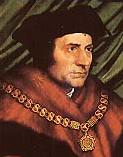|
"My God, the devastation is frightful. It feels like I am seeing
something from the Last Judgment."
More understood the monk's reaction but thought that even this sight was
not as frightful as the night before, seeing the roof collapse and
knowing what it meant. But he said nothing. He looked at the site.
Debris was being cleared. The wounded had already been taken away. The
bodies of the dead, where recognizable, were given to relatives who were
maintaining a commendably composed queue in the circumstances.
For the bodies that were crushed or burnt beyond recognition there was a
team of priests saying a continuous series of requiem masses. Each
corpse was buried in its own grave on the cathedral grounds. In the
weeks to come each would be given its own marble headstone, "Sine
Nomine. Known to God."
Felix was by More's side, "Was it very sudden?" he said anxiously. More
nodded.
Felix became distraught, "Then they died unshriven, without extreme
unction. They may not have been in a state of grace when this terrible
thing happened."
More put his arm around the monk's shoulder and spoke in Spanish, "They
were at evensong, amigo Felix. For an Englishman there is hardly a more
sacred occasion. With the last light of a summer's day shining through
the stained glass windows and the sound of the choir singing the Nunc
Dimittis; I'm sure all souls present were in a state of grace."
Felix wiped his eyes with the sleeve of his cassock, "Thank you, amigo
Thomas. I believe you are right."
More deemed it time to show Felix the evidence he had found the night
before. It was a charred piece of parchment was the top half was quite
legible.
The friar peered closely, "That script, it is Germanic is it not?"
"Yes." More had studied Hebrew under Reuchlin in Germany and had become
quite familiar with that country's language and its Gothic script. "It
says 'Wagonen für Dumkopfen'. It's an instruction pamphlet for would be
wain riders.
"Pamphlets are used by those who are too poor to buy books?"
"Or in too much of a hurry."
Brother Felix cursed pamphlets and printing presses in general. "Those
instruments make knowledge too widespread and put it into the wrong
hands. Before you know it there will be pamphlets showing children how
to make petards."
More laughed, "You Inquisitors certainly fear the worst in people! I
misdoubt any printer would do such a foolish thing." The Englishman
sobered, "But what does this clue tell us?"
"That whoever rode the wain into the cathedral and set it alight was not
an experienced wain driver. That they were either poor or in a hurry."
"Exactly! And to me, Felix, it seems that it was probably a stolen
wain. And a most unusual one, too. For it is not in the nature of
carts to burn so fiercely. It must have had a special cargo; brandy or
lamp oil or the like."
"Si. But if it were stolen then where is the true wainsman?
"If he has not come forward by now, dead I guess."
The monk's suspicious mind moved to a higher level, "Not necessarily.
The wain driver could have been part of the conspiracy and simply passed
on the wagon to a suicidal accomplice."
"I think not," began More, "for three reasons..." But before More could
stun Brother Felix with his deductive powers, a messenger from Cardinal
Wolsey interrupted.
"Good sirs, I was told I might find you here. I bear tidings. A body
was found at Pultney this morning. He was not a local but an innkeeper
recognised him as a carter who often did deliveries for a London
gentleman."
Both More's and Felix's eyes were on the messenger. "Did the innkeeper
know the name?" asked More.
"Not of the carter, sir. But the gentleman is a Master Thomas
Cromwell. He is known to the Cardinal; here is his address." The
messenger passed an envelope to More and departed.
Felix glanced over More's shoulder at the message. The envelope was
encribed, "To Mafter Thos. More - F.T.E.O"
"What is this 'fteo'?" the Spaniard asked.
"It's an abbreviation," More explained, "For Thine Eyes Only. It's just
his grace reminding me to be discrete." He mimicked the cardinal's
sing-song voice, "Do try not to blow everyone up this time."
Cromwell's name had meant nothing to Felix. But Cromwell was well known
to More. "Come, Brother Felix. We must pay Master Cromwell a little
visit. Perhaps he knows the name of the late carter."
"The false one or the true one?"
By now More's mind was working like his colleague's. "The true one,
certainly. The false one, who knows?"
| 
